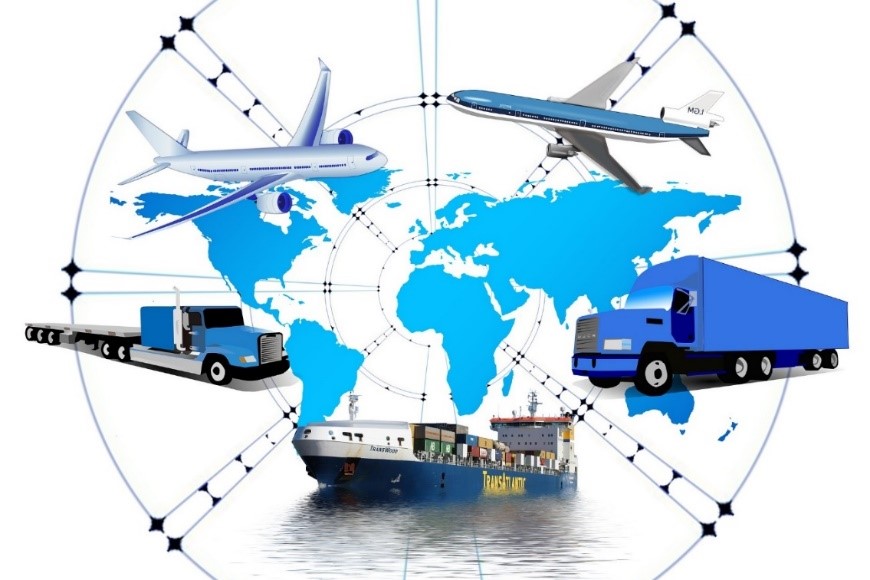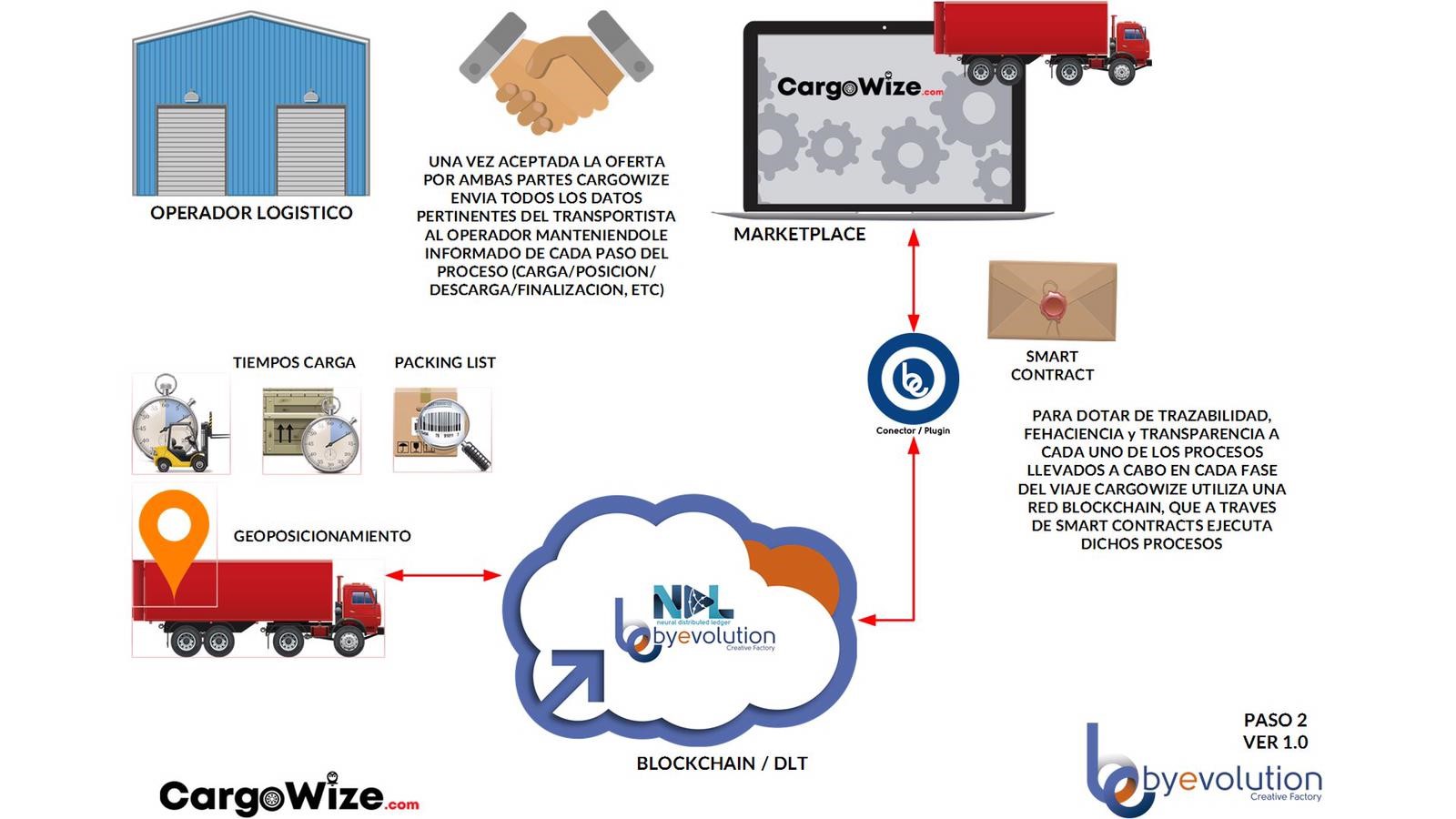The new industrial revolution, the industry 4.0, is the answer to a consumer who demands the availability of products fully customized to their desires, which relaims to obtain them immediately and at competitive costs. To achieve this, innovation and technology are essential, without this would not be possible. Logistics 4.0 is the necessary complement to the industry 4.0, and is characterized by applying the same technologies and applications of the new industry.

Within all these technologies, Blockchain plays a decisive role, but it is not an isolated element, Blockchain efficiency is really achieved when applied in conjunction with the power that the Internet of Things (IT) gives, the massive data (big data) or Artificial Intelligence (AI). We are facing a paradigm shift, Blockchain is the layer of trust and confidence required by the Internet, and is characterized by three key elements: the fact of constituting a reliable network, an efficient and decentralized notary, the use of intelligent contracts (Smarts contracts ), which involves the reliable execution of workflow, not the digitalization of contracts, and finally the ability to use tokens, this concept allows the realization of micropayments between different platforms through virtual wallets.
Blockchain is a booming technology and for the logistics world a paradigm shift, as we had previously commented on the blog. It has the power to resolve the most relevant areas of opportunity in the sector, creating strategic and operational systems that are more transparent, agile and effective.
It is of vital importance for the entrepreneurs of the sector to inform themselves to understand their potential and applications. Starting gradually to implement it and take advantage of its benefits, adapted to our times. The reality is that in a not too distant future, it will become the standard process of transactions and movements. And for all sectors, updating is a fundamental part of growth. As they say: Innovate or die.
But, it is also said: “see it to believe it”, so here you can find:
6 real and current examples of blockchain application in the logistics sector:
1. IBM + MAERSK. TradeLens
TradeLens is an open and neutral industrial platform backed by Blockchain technology, with the collaboration of the main players in the logistics industry.
It gathers several parties to support the exchange of information and transparency, and stimulate innovation throughout the industry.
It uses IBM Blockchain technology as the basis of digital supply chains, allowing multiple business partners to collaborate by establishing a single shared view of a transaction without compromising details, privacy or confidentiality.
Interact more efficiently through real-time access to shipping data and shipping documents, including IoT data and sensors ranging from temperature control to container weight.
Through the use of Smart Contracts, digital collaboration is facilitated among the multiple parties involved in international trade.
TradeLens and its program early-adopter:
94 organizations actively participate or have agreed to join the platform as part of this initiative. They have 20 port operators and terminals around the world.
The customs authorities of the Netherlands, Saudi Arabia, Singapore, Australia and Peru participate, together with the customs agents Ransa and Güler & Dinamik. Transport and logistics companies such as Agility, CEVA Logistics, DAMCO, Kotahi, PLH Trucking Company, Ancotrans and WorldWide Alliance are also in it.
A shipping solution enabled by blockchain designed to promote a more efficient and secure global trade.

2. Skycell. Blockchain + ioT + AI to maintain the integrity of the product, effectively.
Blockchain, with the help of IoT and AI innovations, can be particularly useful to maintain product integrity effectively and to monitor available capacity.
Freight volume often defines the cost of shipping the cargo. By using the IoT sensors in trucks and other vehicles, transporters and transport companies can detect the amount of space occupied in a shipment and determine the cost accordingly, transmitting all this information to blockchain.
Many valuable biopharmaceuticals exceed acceptable temperature ranges and is not known. This fact causes an increase in transportation costs, additional administrative inefficiency and in most cases, the loss of the product itself or destruction of the product due to not having exact information of what has happened.
This Skycell solution addresses this problem, to ensure the integrity of the pharmaceutical product through the use of air cargo refrigerated containers for biopharmaceutical products and monitored with IoT sensors, using the “notary” blockchain to ensure the reliability and integrity of the process.
3. Peloton. Blockchain and ioT for communication V2V
The blockchain technology and Internet of things (ioT) can be combined to improve efficiency in logistics and transport.
Peloton uses this technology to improve vehicle-to-vehicle (V2V) communications, which essentially allow multiple freight vehicles to form a platoon and communicate, improving system efficiency and security.
Storing and validating the data created by the use of V2V communication in blockchain can help transport companies around the world optimize their operations.
4. Vinchain. Vehicle performance history.
The importance of tracking is not limited to delivery performance. It is also applicable to the performance of individual vehicles within a fleet.
When a company wants to buy a second-hand delivery vehicle, blockchain can help authenticate information about the vehicle’s past performance and maintenance history. You can also store and validate all this information for buyers and sellers without the need for an intermediary. This being a much more standardized and reliable solution to determine the prices and other factors inherent in the purchase.
VINchain is a decentralized global database of vehicle information that is 100% transparent, reliable and accessible. It guarantees that the information has not been falsified, changed or eliminated, creating a system of total transparency and trust.
The information is obtained from country registers, insurance and leasing companies, associated services, private registries, payment APIs and certified members. This is captured directly from the vehicle through an on-board diagnostic device (OBD), so the data is live and updated in real time.
5. Sweetbridge. A better way to ensure trust.
Any commercial activity has to deal with four fundamental systems that are independent and often not synchronized due to errors or fraud: identity, legal, accounting and payment systems.
Sweetbridge combines the four systems to eliminate errors, eradicate fraud and restore confidence.
The accounting protocol provides continuous security with integrated identity, legal Smart contracts, intelligent accounting and payment lines.
All integrated into a single atomic transaction that can never be out of sync between the counterparts.
6. European project CARGOWIZE: Contracting logistics services Marketplace.
Cargowize (www.cargowize.com) is implementing a disintermediated business model, based exclusively on blockchain, with which it aims to provide an efficient response to the now classic model of logistics services contracting.
New focus:
- From Marketplace to Smart Web Online Platform.
- There is no auction. The platform automatically quotes the service according to the framework contract defined with the logistics operators. Carriers approved and verified by Cargowize.
- The service request is sent to the best geo-positioned carriers indicating price, origin, destination, cargo, etc. The carriers chosen by the platform receive the request simultaneously. From the application they have accepted the service, the first to accept takes the load.
- Smart contract generation for each shipment / transaction, allows positioning, loading times, etc. tracking.
Value added by blockchain to the business model
- Business model based exclusively on blockchain
- Elimination of intermediaries, makes it impossible to outsource services (the company that accepts the order, carries out the transport)
- Inviolability of information
- Eliminates disputes between the parties involved (shipper, carrier and consignee), related to waiting times, location, traceability, etc.
Return of investment
- 99% Automated and scalable operations – Great savings on operating expenses
- Blockchain implementation amortized in 3 year
- Payment per use of transactions / Smart contracts

For the implementation of the project, Cargowize has had the blockchain solutions developed by the Spanish company Byevolution ( byevolution.com ) .
Blockchain is an absolute game change.
The role of blockchain in logistics will continue to grow and with it, the efficiency and profitability of the entire industry. Each time, more companies come together to incorporate blockchain-based technologies.
Once a company understands and recognizes the potential of blockchain technology to impulse efficiency and value, the next step is to establish a roadmap for the application, define a use case.
This should start with the willingness to collaborate and involve the construction of blockchain knowledge and skills with a focus on generating value for all stakeholders.
We must demystify technology, because as my point of view, it is only one more IT project, but this will be the subject for another blog post, to explain how a blockchain project is implemented in logistics environments.
Finally, it is important to mention that according to Morgan Stanley: “The income opportunity for blockchain within the logistics sector could reach up to $ 500 billion.”
To put things in perspective, that’s almost double the current market capitalization of the cryptocurrency in general, which means we’ve barely seen the tip of the iceberg.
Therefore, we can say that the future of blockchain in the world of logistics is brilliant; we must be prepared to capture the opportunities it generates for our companies.


